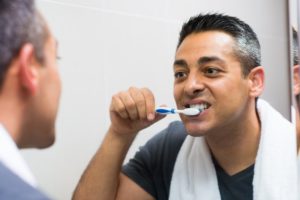4 Telltale Signs That You Might Be Brushing Too Hard
November 24, 2020

It’s time for bed, and you’re on your final ritual of the night: brushing your teeth. As you finish brushing, you notice a bit of pink in your sink. You inspect your gums, but you don’t see any inflammation. Are you just brushing too hard? This act, also known as tooth abrasion, can damage your smile in more ways than one. If you’re not sure if your brushing techniques are harming your teeth, a visit to your dentist in Pleasant Grove can help. Here are a few telltale signs that you may be brushing too forcefully.
Frayed Toothbrush
You may not even have to look at your mouth to determine if you’re brushing too hard. One way to tell is to look for damage to your toothbrush. With regular dental care, the bristles can fan out over time. But if the bristles are splayed out before three months have passed, you are probably overbrushing.
Dull Teeth
Some think that brushing hard or using a hard-bristle toothbrush will help make their teeth whiter and cleaner, but this is not the case. Enamel is what gives your teeth their white color. Pressing too hard when you brush can wear your enamel down faster than normal. If your smile appears dull, you may have worn the enamel down so much that you’ve exposed the dentin.
Tooth Sensitivity
As you unintentionally, but vigorously brush away your enamel, your tooth’s dentin will become exposed. This will cause increased sensitivity, due to the tiny tubules in dentin that connect to nerve tissue. Enamel is one of the hardest tissues in the body, but because it is not living tissue, it cannot grow back or be restored. This means that your dentist may recommend special toothpastes or mouthwashes to help combat your newly found tooth sensitivity.
Gum Recession
Brushing too hard can also damage your gum tissue, causing them to bleed. But repetitive damage from forceful brushing can even cause your gums to recede. When this happens, more and more of your tooth becomes exposed, and you put your dental health at risk.
Brushing your teeth regularly is a crucial part of good oral health. But doing it too forcefully can put you at a higher risk of developing cavities or other more serious dental issues. Try decreasing the amount pressure used when you brush for a few days to see if that helps. If your symptoms persist, it’s important to get to your dentist as soon as possible to figure out a plan to save your smile.
About the Author
The team at Bear Creek Family Dentistry is committed to providing patients of all ages with quality dental care. Their team of general dentists and specialists use advanced technology to treat all of your dental needs from preventive and pediatric dentistry to oral surgery and more. If you think you may have been brushing too hard and need dental advice, contact the office at (214) 381-3800 or visit the website.
No Comments
No comments yet.
RSS feed for comments on this post.
Sorry, the comment form is closed at this time.
